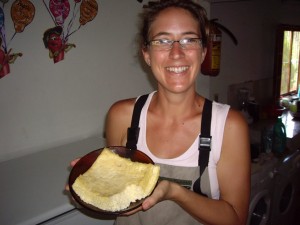 During our sabbatical in Paraguay, we started a free clinic using donations from patients back home.
During our sabbatical in Paraguay, we started a free clinic using donations from patients back home.
As word spread, it became a common sight to find people scattered about the various shady spots outside our makeshift clinic waiting for la doctora, and trying to get a some relief in a place where a dollar day wasn’t an uncommon wage.
Despite our best efforts to offer free care, though, it wasn’t long before payment started to arrive anyway. Sometimes it was mangoes, other times mandioca, bananas, corn bread and other locally grown goods, but it was payment just the same.
One of the first and most memorable of these, though, was a large plate of home made cheese.
The idea of cheese as money kinda stuck with me, and in a strange way, it’s been a helpful metaphor. So from the good people at the Dairy Department of The Practitioner’s Journey, here are a few Gouda ideas about money and practice…
1. Don’t Manage Your Patient’s Cheese
We have an expression we use when helping other practitioners: Don’t manage your patient’s wallet. Your services may be expensive for your client, or they may not be. The point is, you usually have no way of knowing for sure.
In practice you’ll find millionaires who won’t pay for their next treatment, and others who are struggling financially but never miss a beat. Value is subjective, and it’s your patient’s job to manage their cheese, not yours. Your job is to accept the cheese, should they choose to offer it.
2. Unclaimed Cheese Doesn’t Last Long
Accounts receivable are not like old cheddar – they don’t get better with age. And they’re not like Cheez Whiz, either, which, never seems to change with age at all. The money your patients owe you is very likely to be spent on other things if you don’t receive it. The lesson? If you have receivables, keep an eye on them – don’t let your cheese go bad, or be claimed by someone else.
3. You Can’t Afford a Dairy Intolerance
The natural medicine professions seemed to be particularly prone to financial struggle, much of it mental/emotional. We often hear (and to be fair, we’ve said it many times ourselves), “Won’t it be great when we don’t have to deal with this marketing/accounting/bookkeeping so we can just be doctors?”
The truth is, being a CAM practitioner almost always means you’re in business. And being in business means you have to accept money as a fundamental. You can’t have a dairy intolerance. You need to count your cheese properly. Make sure you have at least as much coming in as going out most of the time. You’ve got to care about the cheese. You don’t have to love it or worship it, but you can’t avoid it either.
4. Cheese Isn’t Evil…It’s Just Cheese
Money’s a handy thing. In our culture, though, it’s infused with meaning, not all of it positive, and it’s easy to forget that money is just a simple way to exchange goods and services. Being paid in live chickens, coconuts or tangerines is not always the easiest way to run a business.
The most powerful part of being paid in cheese was recognizing that it was a perfectly valid form of payment, but one that wasn’t negatively charged. Somehow, being paid in cheese was…easier. Part of that was our willingness to simply provide the service for free in the first place, but there was more to it. Stripped of its emotional baggage, it was just…cheese. Even being used as a form of payment, it was still cheese.
Cheese is just cheese, in the end, and money’s like that, too. It’s just paper. It’s a simple tool that makes it easier to be in business. It’s a convenient, universal symbol of value that lets you be a practitioner without your patients bringing squealing pigs and sacks of grain into your office. And trust us: most of the time, it’s a lot easier that way.
Until next time, don’t worry, Brie Happy… 🙂



Loved the cheese posting! I have linked it for my class! Can’t wait for your visit!
Thanks, Jonathan!
[…] Being paid in cheese was certainly a unique experience. What was most empowering about setting up practice in a developing nation, though, was the realization of how easily small actions can make a big difference. […]
[…] might have its own unique path and nature, but at the end of the year, I want all those bovine bits to arrive at the same […]